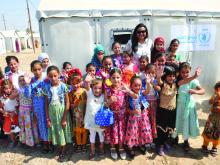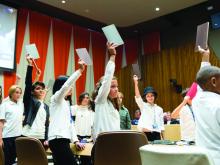The Role of UN-Water as an Inter-Agency Coordination Mechanism for Water and Sanitation
By 2050, the world’s population will have grown by around 2 billion people and demand for water will increase up to 30 per cent. Water is finite, so we must ask: how are we going to balance all of the competing demands on water resources while meeting our obligations to fulfil every person’s human right to water and sanitation?
Achieving Universal Access to Water and Sanitation
At a most basic level, human beings cannot survive without water. Equally important is sanitation, a lack of which negatively affects our quality of life and claims the lives of millions each year.
Foreword
People are saying that the next war will be about water, President of the General Assembly Miroslav Lajčák said at a gathering of students at Seton Hall University, a member of the United Nations Academic Impact, a few months ago. Let's make sure there will be no next war and let's make sure that we treat water the way it deserves.
Multilingualism and Global Citizenship
Finding ways to build bridges between our diverse cultures, transcend borders and connect nations and peoples, while showing respect and appreciation for their unique differences, may sound like a tall order that many believe has little chance for success.
The Role of Civil Society in Advancing Global Citizenship
It is the responsibility of civil society to experiment with models of effective global citizenship, to understand, care and act on behalf of people and the planet through ecological and socially inclusive principles and practices. Global citizenship is transforming the worlds of art, business, culture, education, human and labour rights, religion, public health, politics and our relationship with nature.
Multilateral Diplomacy and Global Citizenship
The international community should discuss how global citizenship education on can be inclusive and respectful, universal in its principles and local in its impact, and how it can equip all learners with the capacities and qualities necessary to address the complex problems facing humanity today.
The Islands in Our Minds: Reaffirming Global Citizenship Education
We have arrived at a point when educators need to reflect on their role as global citizenship advocates and facilitators. A conscientious introspection can help us to determine if there are any insular viewpoints or “islands” in our own minds that need to be addressed for us to become efficient global educators and to effectively transform today’s students.
Youth Lead the Way to a More Connected and Sustainable World
In bringing people together from different backgrounds, the Internet and social media are becoming instrumental thanks to the opportunities for connectivity and reach that they enable. Since youth are at the forefront of the use of technology, they are the best equipped generation and our best asset to lead this task and promote global citizenship around the world.
Young People's Civic and Political Engagement and Global Citizenship
Educational effects are further amplified if schools adopt a competence-based curriculum in which the competences required for civic and political engagement are targeted. Such a curriculum aims to enhance not only students' knowledge and skills, but also their values, attitudes and critical thinking, so that they are empowered to act as autonomous agents capable of pursuing civic and political action effectively.
Global Citizenship: Imagined Destiny or Improbable Dream
The ideals of global citizenship encompass the notion of a culture of peace and non-violence, and can be fostered at home and in school by linking the news, literature and popular music to discussions of everyday and historical topics, by teaching respectful critical thinking and expression, and by emphasizing compassion and cooperation in the face of multiple forces which give priority to competition.










